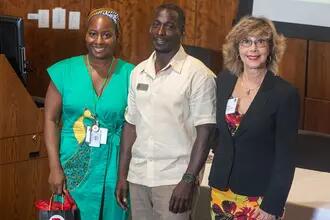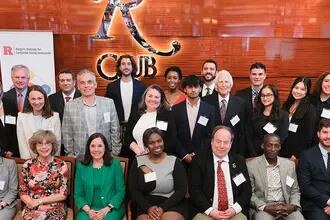
Gary Cohen addressing an audience of university administrators who met on the Rutgers University-Newark Campus last year to discuss meaningful ways to help achieve the United Nation's 17 Sustainable Development Goals.
Executive Insights: Leading the way in Corporate Social Innovation
In a special issue of the Rutgers Business Review that focuses on corporate social innovation, Noa Gafni, executive director of the Rutgers Institute of Corporate Social Innovation, and Jeana Wirtenberg, an associate professor of professional practice of management and global business, interviewed Rutgers MBA alumnus Gary Cohen about his views on the role of business in society.
Cohen, executive president, Global Health, and president of the BD Foundation (Becton, Dickinson and Company, also explains how he has been able to bring about transformational change on a global scale and how BD’s four-method model of corporate social innovation can be applied to other companies and industries.
Cohen will help to open the Fifth PRME Northeast Virtual Conference on Monday, Oct. 6. The three-day event on "Sustainable Development Goals: Transforming Business Education and Practices" is being co-hosted by UN PRME, Rutgers Business School and the Rutgers Institute for Corporate Social Innovation. View the program and register now.
This is the interview with Cohen as it appears in Rutgers Business Review:
Q: Can you tell us about what you are doing now and the path that brought you to your current role at Becton, Dickinson and Company (BD)?
A: I presently serve as executive vice president, Global Health and president of the BD Foundation at Becton, Dickinson and Company (BD), a global medical technology company with 65,000 employees worldwide. I began working at BD in 1983 after earning an MBA at Rutgers Business School. My first job was as a marketing research analyst. I advanced through different positions in marketing and then into general management and senior leadership roles in the company, including president of two global businesses, executive vice president of BD Medical (the company’s largest business segment) and then led all international operations. BD Global Health, which I founded within the company, was first established in early 2004. This was a direct outcome of a delegation trip I joined in December 2003 with many of the world’s foremost health leaders to study the impact of HIV and AIDS on four countries in sub-Saharan Africa. Throughout my career I always took interest in the role business can serve in addressing major societal problems. Though this particular trip to Africa catalyzed a course change in my professional and personal life. From there, I began to devote a significant amount of my time and energy to addressing some of the most challenging health problems affecting vulnerable populations. In 2012, I transitioned fully out of the more traditional operational roles in the company in order to focus full time on global health. BD Global Health engages in cross-sector collaborations to address unmet health needs globally, working with international agencies, governments and non-governmental organizations, focused on specific health goals such as strengthening clinical and laboratory practices, safely immunizing children, addressing infectious and non-communicable diseases, reducing maternal and newborn mortality, improving safety for health workers and patients, and combating antimicrobial resistance. More recently BD Global Health, and the company overall, are devoting disproportionate focus to addressing the global COVID-19 pandemic. In addition to my role at BD, I served for 13 years as a board director and former chair of the CDC Foundation, and presently serve as a board director of UNICEF USA, board co-chair of GBC Health, and board chair and founder of Together for Girls, a global partnership of national governments, UN agencies and private sector organizations dedicated to stopping violence against children, particularly sexual violence against girls. I also presently serve as chair of the CDC/Corporate Roundtable on Global Health Threats, and as a board director of the Partnership to End Violence Against Children. Associated with these various roles in the business, public and NGO sectors, I am frequently asked to serve as an expert speaker and advocate on topics related to advancing health and human rights. I’ve had the privilege to speak in important venues such as the United Nations, Vatican, World Bank, World Health Assembly, U.S. Department of State and World Economic Forum-Davos. I’m proud that in doing so, I not only represent BD but also my status as a double Rutgers alum. I hold B.A. and MBA degrees from Rutgers University. In 2016, I was named a Rutgers 250 Fellow in association with the university’s 250th Anniversary. In 2018, in collaboration with Rutgers Business School, I founded the Rutgers Institute for Corporate Social Innovation.
Q: How has the role of business in society evolved? What are the major trends you see unfolding?
A: There is an increasing understanding that the business sector possesses capabilities that can help to address some of the world’s most challenging problems. However, traditional business leaders and companies may not have had the mindset, motives or incentives to focus on unmet societal needs, and investors typically evaluated companies almost solely on their financial performance. This is now changing. Investors who focus on societal impact, using ESG (Environmental, Social, Governance) and other measures, are becoming increasingly influential as they take larger ownership positions in publicly traded companies. There is increasing evidence that purpose-driven companies, those that focus on being positive actors in society, are outperforming peer companies in their industries. Companies are being encouraged to use their capabilities to address unmet societal needs not only by their boards and an increasing proportion of their investors, but also by their customers, governments and their own employees. The most advanced companies, those that integrate societal needs into their core business strategies, are reaping reputational and business benefits, and are being widely recognized as beneficial actors in society. Companies with bad business practices risk losing substantial market value and the loyalty of their customers. The right choice here seems pretty clear. Also, unlike in past decades, influential organizations in the public and nonprofit sectors are welcoming the engagement of business in addressing global problems and unmet societal needs. For example, the United Nation’s Global Goals, otherwise known as the Sustainable Development Goals, invited and even encouraged the engagement of the business sector, whereas the predecessor Millennium Development Goals did not. Based on the unique characteristics of my professional roles, I personally had opportunities over many years to engage with public sector organizations such as UN agencies and to speak at their meetings, though often I was the only representative from the business sector invited to participate. This is now changing, particularly as a result of the Global Goals and the need to engage the business sector in solving major global problems.
Q: Can you tell us about corporate social innovation (CSI) and how you define it?
Corporate social innovation (CSI) integrates a full range of capabilities and assets within innovative business models to achieve positive societal impact while advancing the success and sustainability of the enterprise. Through my experiences in BD, we developed several novel business models to advance CSI. Among these is a four-method model that any company can utilize to achieve positive social impact. The four methods are: corporate philanthropy, corporate social responsibility, shared value creation, and advocacy and public policy. Corporate Philanthropy involves charitable giving, donation of cash or in-kind products and services for the purpose of supporting nonprofit organizations involved in addressing social causes. Companies can amplify the impact of their philanthropy if they find ways to link it to their areas of domain expertise. This is sometimes referred to as “social investing.” A key limitation of corporate philanthropy is companies, as for-profit institutions, can only give away a small percentage of their earnings. One example of a substantial corporate philanthropy commitment is Merck for Mothers, a $500 million initiative to create a world where no woman has to die giving life. Corporate Social Responsibility (CSR), a term popularized in the first decade of this millennium, is the use of a company’s resources, business processes, and core competencies to produce an overall positive impact on society that is not directly linked to the company’s commercial activities or financial performance. CSR initiatives can potentially reduce financial risks and produce positive reputational benefits for companies. As with corporate philanthropy, there are limits to the amount of resources companies can devote to CSR, as these activities typically generate cost rather than profit for companies. Much of the investment and work done by companies to advance environmental sustainability by reducing their carbon footprint falls into the category of CSR, though if by doing so they achieve cost savings or attract new customers this can become shared value creation. Shared Value Creation occurs when a company utilizes its core business models, products and services to solve societal problems in a manner that also drives business opportunity and positive financial impact. “Shared value” means creating value both for society and for the business enterprise. Companies that are proficient in shared value creation integrate solving unmet societal needs into their core, long-term business strategies. Unlike CSR, shared value creation generates profit rather than cost, enabling positive impact to be achieved at far greater scale. BD’s healthcare worker safety initiative, where the company made massive investments to revamp its product portfolio to protect clinicians and other health workers from accidental needlestick injuries, is an example of a shared value initiative that went to full scale. Advocacy and Public Policy is when a company utilizes its public affairs capabilities to actively support changes in laws, guidelines, and regulations in order to achieve positive societal outcomes. Large companies often have a public affairs function, and possibly a policy office in Washington D.C., that engages with policymakers to advocate for the benefit of their company or industry. This capability can also be utilized to advocate for policies that are in the public interest. Alignment of national and international policies can be very beneficial in bringing positive societal initiatives to fuller scale. The engagement of many companies in the early 2000s via the Global Business Coalition on HIV/AIDS in support of massive scale-up of antiretroviral treatment access for people living with AIDS in Africa was a significant example.
Q: What are the benefits and challenges for companies that want to integrate corporate social innovation into their business strategy?
A: As noted, whether company leaders recognize it or not, there is a fundamental shift occurring in the expectation of business serving a positive role in society. This is not coming only from social activists; it is increasingly an expectation from investors and political leaders. Companies that recognize and align with this trend will be more resilient and less likely to engage in practices and behaviors that label it a “bad actor.” Additionally, there is an increasing body of evidence indicating that the companies that integrate positive social impact into their long-term business strategy outperform those that do not. These companies will be more successful in attracting customers and investors. They will also generate higher engagement and loyalty within their workforce, and will be more likely to attract top talent, particularly among millennials and younger generations. There are numerous challenges for companies that want to pursue this pathway. These companies need to be able to engage and build trusting relationships with a broader group of stakeholders, including those from outside the business sector. To do so, they will need to demonstrate their intent not only in words but also in actions. This may require companies to recruit and promote leaders who possess a different mindset than traditional businesspeople. Leaders who are proficient in CSI engage collaboratively outside of their normal business circles; they rely less on hierarchical authority and they possess some of the skill sets normally associated with diplomacy. To do so authentically, these leaders need to have motives that are well aligned with the expectations of the other stakeholders involved. Accomplishing this requires companies to overcome a substantial internal challenge. Many traditional business leaders think of social innovation as being purely “do good” work, akin to charity. Their experiences and paradigm of business leadership may have evolved purely around concepts such as hierarchical management and shareholder primacy. Changing these mindsets is not easy. If company executives view corporate social innovation as simply another form of charity or social responsibility, and not integral to their business strategy, it will diminish the influence and impact of their most capable associates and leaders who are seeking to break new ground by applying these practices. This is the most common challenge I’ve seen in companies with respect to CSI, it even exists within companies that have demonstrated proficiency in these practices. One of the biggest transitions that needs to occur is for senior leadership to recognize that positive societal impact is not a sideline issue or distraction, rather, it can be among the most influential factors driving their business performance. Walmart is among the companies that made this transition.

Q: Shared value creation is still in the early stages of adoption by companies. What distinguishes shared value from other methods of social impact? How would you describe shared value in practice?
A: The most significant factor that distinguishes shared value creation from other methods of social impact is that it drives commercial gain as well as social benefit. It is embedded in the core strategies and business model of the company. This enables shared value initiatives to be taken to a far greater scale than philanthropy or CSR initiatives. In fact, in theory, there is no limit to the scale; it can be taken as far as the market opportunity allows. As mentioned earlier, one example from BD where shared value was taken to scale involved our healthcare worker safety initiative, which responded to the need to protect health workers from occupational injuries that can spread infectious diseases such as HIV and AIDS. This initiative started in the late 1980s. BD’s strategy included massive investment in design and manufacturing of needle devices with built-in protective features to protect health workers from accidental sharp object injuries. Though it also went well beyond that. When BD started this initiative, there was no customer demand for these devices. We needed to engage in developing the market. To do so, we collaborated with experts and safety advocates to create new educational programs to build awareness, and with researchers to fund development of new surveillance systems that track and measure the impact and cost of sharp object injuries. We also engaged with policymakers and a diverse group of stakeholders to advocate for changes in laws and regulations to ensure that healthcare institutions transitioned to the newer safety needles. The outcome of this work, which has continued for more than 30 years, has been a significant reduction in injuries to health workers, and substantial growth in BD’s revenues. In fact, needle safety devices became the largest single source of the company’s organic (non-acquisition) growth over the past 30 years.
Q: Both in healthcare worker safety and many of your other leading CSI initiatives, public-private partnerships (PPPs) played a key role. What are the advantages as well as challenges of PPPs?
A: Public-private partnerships (PPPs) are a practice whereby companies collaborate with public sector agencies and institutions to address a societal need or problem. They are difficult to execute successfully, and many fail. There is a lot of rigor that goes into developing successful PPPs. But when they do succeed, the impact can be transformative. In 2007, we partnered with the U.S. Department of State, through the U.S. President’s Emergency Plan for AIDS Relief (PEPFAR), to launch a new PPP that is today named “Labs for Life,” focused on strengthening health systems in emerging countries, specifically laboratories in sub-Saharan Africa and India. It was a joint commitment by PEPFAR and BD, for which we jointly funded $18 million. On the BD side, our funding was primarily in-kind support for training and travel. BD deploys the company’s lab experts as fellows who work hand in hand with experts from the U.S. Centers for Disease Control and Prevention (CDC). This PPP has had enormous positive impact, and results have been published in The Journal of Infectious Diseases, a highly respected peer-reviewed publication. Labs for Life has also stood the test of time, it has been operating for more than 10 years. It is unusual for a PPP to have this level of longevity. I’m often asked about what makes a PPP successful. It is more of an art than a science. It begins with alignment of motives. All the parties involved need to be pushing towards the same goals and outcomes. If motives are not aligned, the PPP will likely unravel at some point. Clear objectives and measures need to be established at the outset. Our most important PPPs typically required as much as one year of advance planning and activity, including the development of a detailed memorandum of understanding (MOU). And all the parties to the PPP need to assign people who are naturally collaborative and skilled at working with counterparts from different sectors. People who are uncomfortable operating outside their familiar environments will not do as well in a PPP. Those who are open to new experiences and are very focused on working collaboratively to achieve positive societal impact are particularly well suited.
Q: Can you talk about why you decided to form the Rutgers Institute for Corporate Social Innovation at the Rutgers Business School?
A: There are two key trends that made me think we needed to do this. The first is something we have already covered, there is an increasing expectation that the business sector will engage in helping address challenging societal needs. The second trend is the high level of interest among Millennials and younger generations in devoting their careers and lives to accomplishing social good. It seems the younger the generation is, the more they feel compelled to pursue purpose-driven careers that enable them to contribute to society in addition to achieving personal success. This naturally led me to think about how university business schools are building these practices into their curricula and research. In my observation, while there are excellent programs in many universities on topics such as business ethics and CSR, the most progressive companies, the CSI leaders, possess unique competencies and know-how that were not covered or captured in business school programs. I formed the Rutgers Institute for Corporate Social Innovation (RICSI) to build these best practices into the curricula and programs at Rutgers Business School, in order to inculcate these practices in future generations of business leaders, who will then incorporate societal impact into their business strategies and agendas. I believe that upcoming generations of future business leaders will take great interest in this. The RICSI is bringing together leaders from the private, public, and nonprofit sectors to collaborate with top scholars in advancing CSI. The objective is to highlight the experiences of the organizations that are effectively applying social innovation to company strategy and incorporate these methods into research as well as coursework. The RICSI is also creating links with other schools across Rutgers to develop a leading-edge curriculum, as well as serving as a center of excellence for research and engagement for academia and industry.
Q: You have a long and successful career as a business leader, and uniquely, you also have a notable reputation for positive impact among leaders in the public and nonprofit sectors. What advice do you have for the next generation of business leaders who may have similar goals?
A: It is important for students and employees to understand what they are seeking to accomplish, not only in their career, but also in life – what generates fulfillment for them. I encourage students to pursue very successful careers regardless of their chosen field. As they do, I also encourage them to use their success and influence to accomplish good in the world. In my view, when you push to achieve your human potential to the fullest, to achieve “the top of your game,” the best reward for this success is the opportunity to impact the world in a positive way. I’ve learned through my experience that this combination of pushing hard to achieve your human potential and utilizing your success to benefit others is the key to personal fulfillment. And it can be applied literally to any field, profession or area of responsibility. Another way I encourage students to think about this is to imagine themselves near the end of their lives and looking back, which is maybe not something natural for them to do, and to think about what they will be proud of, and what they might regret. Most of their life story has not been written yet, and they have an opportunity to “write” their story the way they want it to turn out. Pursuing a successful career that accomplishes good in the world is the way to achieve a life well lived. Students should be thinking ahead not only about their career success, but also about their life success. We have a saying here at BD that I coined some years ago and it is used pretty broadly now: “Fulfilling your life’s work during your work life.” BD is the type of company where our employees are afforded the opportunity to fulfill that sense of personal purpose while pursuing a successful career, and I really encourage new graduates to seek both. Pursue career success and also distinguish yourself based on your character, integrity and positive impact on your communities and on the world.
Gafni, N. & J. Wirtenberg. 2020. Executive insights: Leading the way in corporate social innovation – An interview with Gary M. Cohen, Executive Vice President of Global Health & President of the BD Foundation. Rutgers Business Review, 5(2): 248-458.
Press: For all media inquiries see our Media Kit


